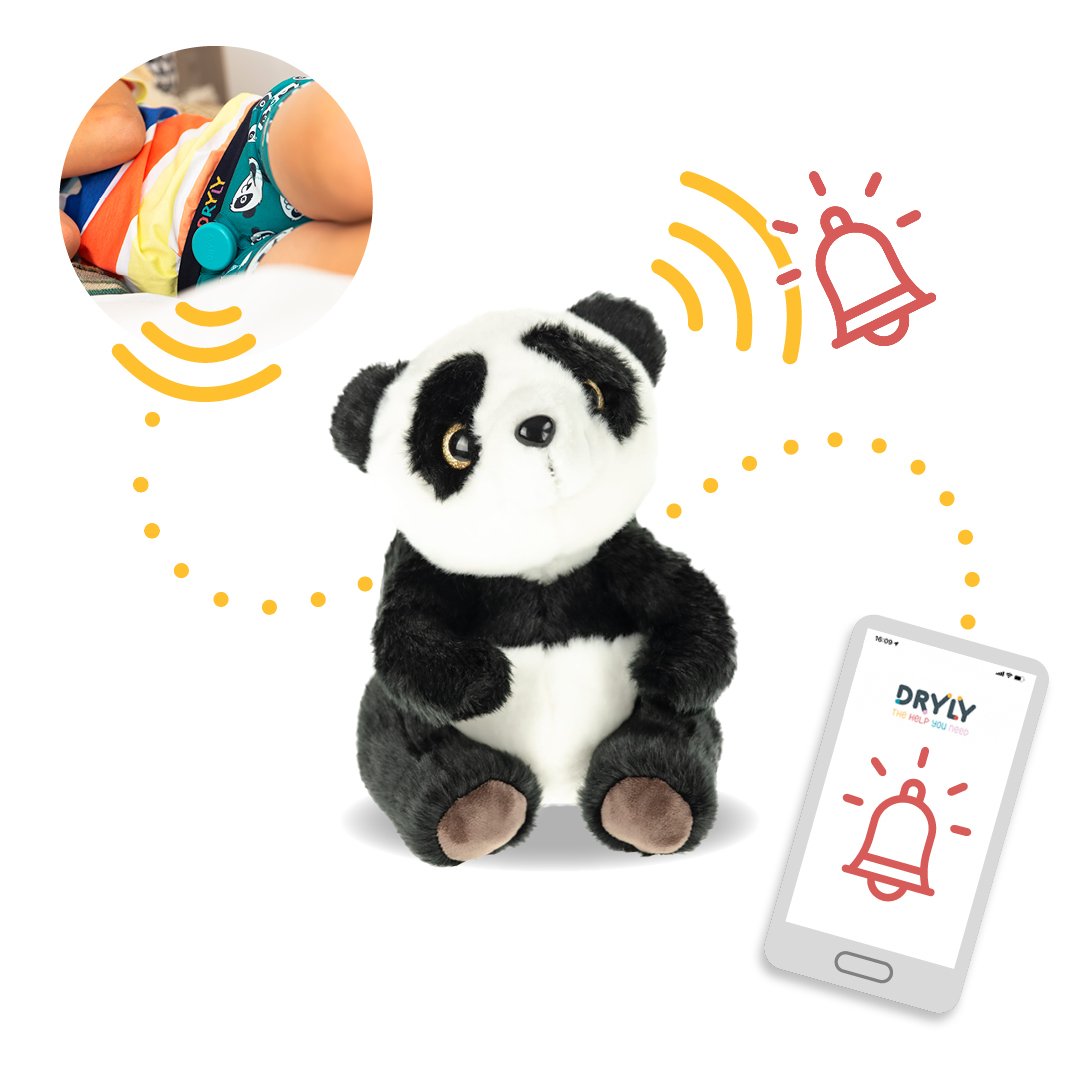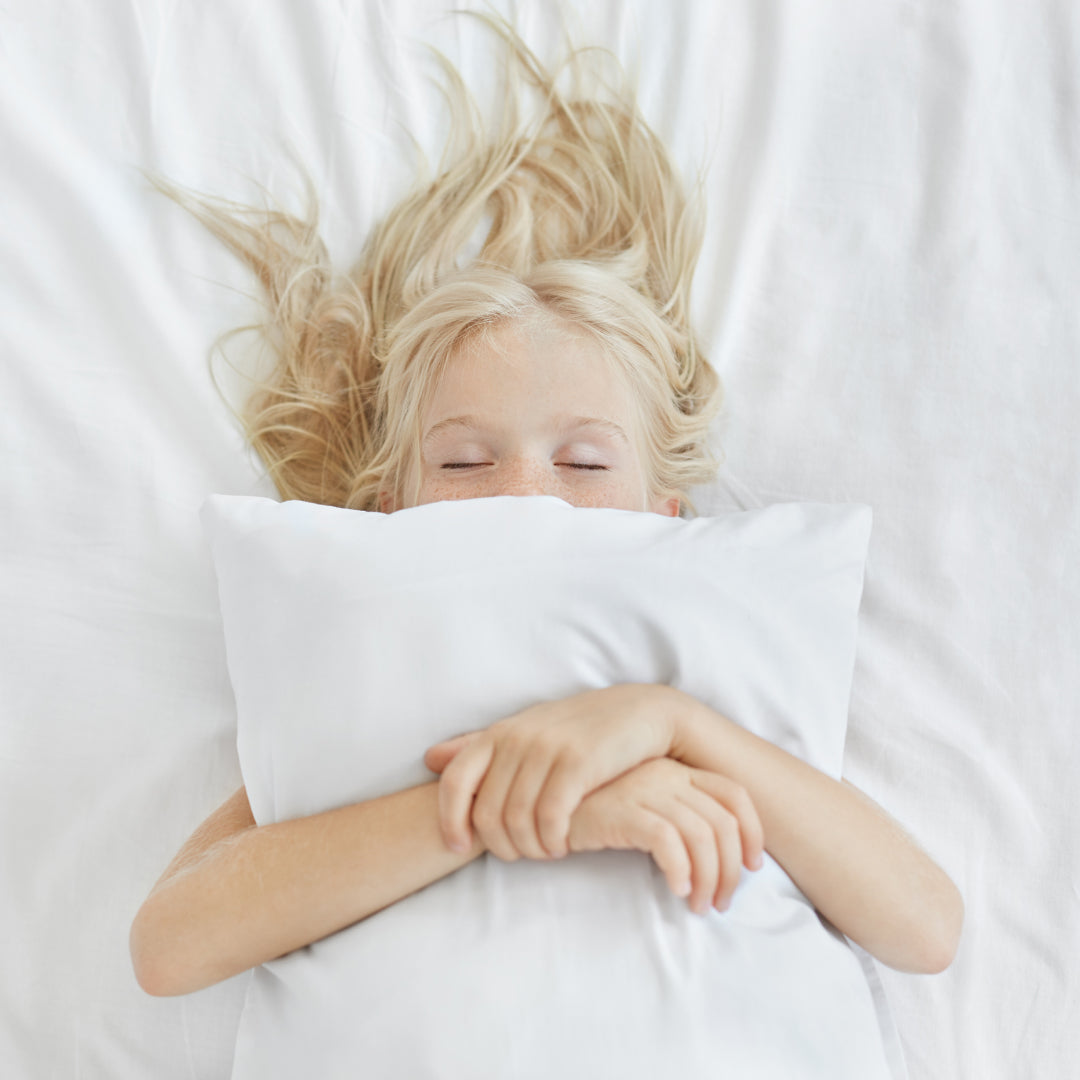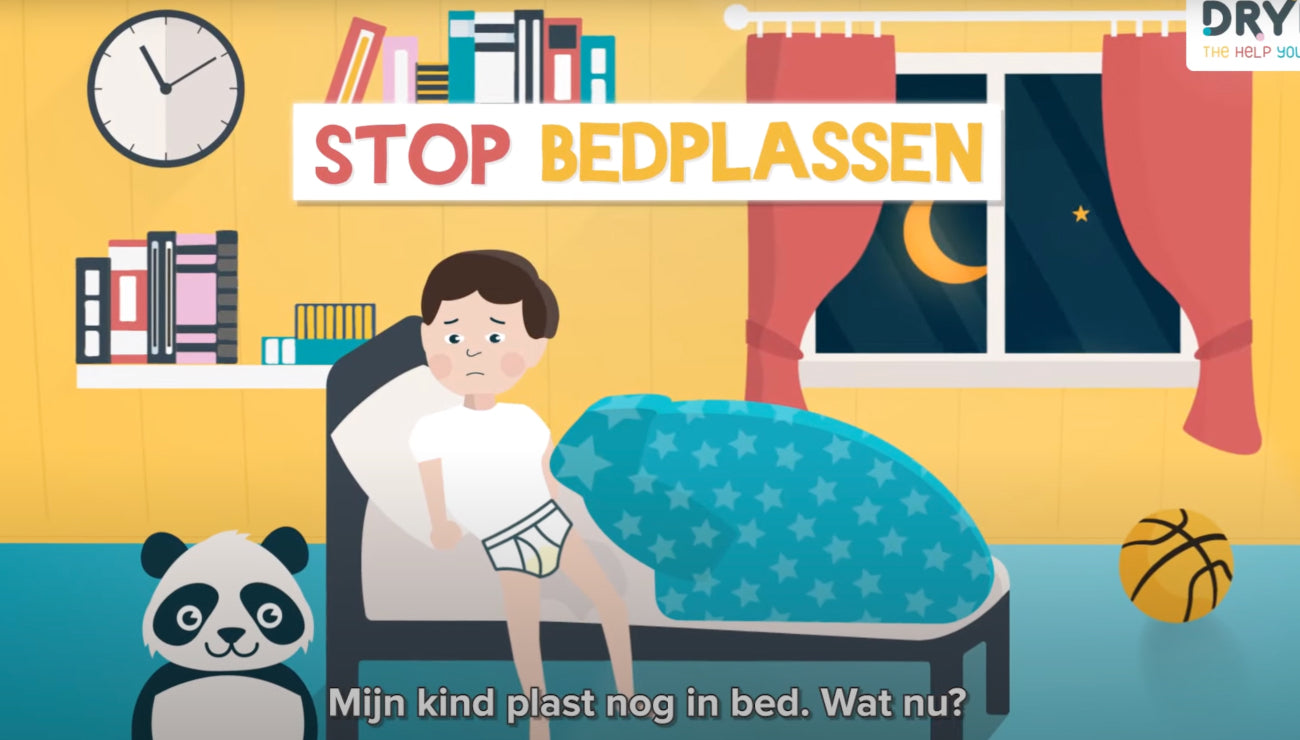Bedwetting
Bedwetting, also known as enuresis nocturna, is the involuntary urination during sleep, usually in children but also in adults. This can be a frustrating and sometimes embarrassing problem for both the person dealing with it and the parents. Although bedwetting is common in young children who are not yet fully potty trained, it can persist in some children and even adults. Bedwetting can have several causes, but the good news is that it often goes away on its own and there are several treatment options available.
Because it is often not talked about much, children (and parents) get into the mindset that they are on their own. We are changing that!
Causes of bedwetting
There can be several causes of bedwetting. In young children, it is often a matter of bladder control not yet fully developed. In older children and adults, bedwetting can be caused by an overactive bladder, hormonal imbalances, or a deep sleep rhythm where the signals of a full bladder are not noticed. Hereditary factors can also play a role; if one of the parents suffered from bedwetting, the child is more likely to have the same problem. Medical causes such as urinary tract infections or diabetes can also contribute to bedwetting.
Bedwetting in children
Bedwetting is common in children, especially under the age of five. At this age, bladder control is often still developing and accidents at night are common. As children get older, their brains improve their ability to recognize signals of a full bladder, allowing them to stay dry at night. However, if a child over the age of five regularly wets the bed, there may be enuresis nocturna, which requires extra attention and guidance. As a parent, it is important to remain patient and supportive and avoid punishment.
Bedwetting in adults
Although bedwetting is less common in adults than in children, it can still be an annoying and embarrassing problem. Adults who experience bedwetting can have several causes, including stress, medical conditions such as diabetes or sleep apnea, or an overactive bladder. It is essential to seek medical attention when bedwetting occurs in adults, as it can sometimes be a symptom of an underlying health problem. There are treatments available that can help, such as medication or behavioral therapy.
Treatments for bedwetting
There are several treatments available for bedwetting, depending on the cause and the age of the person. One of the most effective treatments for children is the use of a bedwetting alarm. These devices detect moisture and wake the child as soon as the first drops of urine are released, allowing the child to learn to wake up and go to the bathroom. For both children and adults, behavioral techniques such as limiting fluid intake before bedtime and bladder training can be effective. In some cases, medication such as desmopressin may be prescribed to reduce urine production.
Why is bedwetting unlearning important?
The bedwetting problem is an annoying one where the child not only suffers from fatigue and physical problems. But a child's mental health can also suffer greatly. So why unlearning bedwetting is important is to give your child back the confidence he/she needs to function well in everyday life. A child's self-confidence then also makes for better performance both socially and in school. So when your child has the motivation and wants to get rid of the problem immediately find a solution to get rid of bedwetting!
What can you do as a parent?
As a parent of a child who bedwetters, it is important to remain patient and support your child without shame or punishment. Talk to your child about the problem and make sure they know that bedwetting is a common and normal occurrence during development. A reward system can help motivate your child to achieve dry nights. Also provide practical solutions, such as using a waterproof mattress protector and washing bedding regularly to maintain hygiene.
Heredity and bedwetting
There is evidence that bedwetting is partly hereditary. If one or both parents suffered from bedwetting as children, their children are more likely to experience the same problem. Research shows that if both parents bedwettered as children, their children have a 75% chance of also developing bedwetting. This genetic aspect means that bedwetting often has nothing to do with behavioral problems or lack of discipline, but is a matter of physical development.
The emotional impact of bedwetting
Bedwetting can take an emotional toll on both children and adults. It can lead to feelings of shame, guilt, and frustration, especially in older children and adults who fear they are outside the norm. For children, it can even lead to avoidance behaviors, such as refusing to go to sleepovers or school camps. As a parent, it is crucial to acknowledge this emotional impact and support your child by discussing the problem openly and seeking a solution without judgment.
When to see a doctor?
In most cases, bedwetting is a phase that children grow past naturally. However, if a child is older than seven and still wets the bed regularly, it may be wise to consult a doctor. Adults are also advised to seek medical attention, especially if bedwetting begins suddenly or is accompanied by other symptoms such as pain, frequent daytime urination, or unexplained thirst. A doctor can help identify the underlying cause and suggest appropriate treatment.
Tips to prevent bedwetting
There are several strategies that can help reduce or prevent bedwetting. One is to limit fluid intake in the hours before bedtime so that the bladder is less full during the night. It is also important to instill a regular toilet habit by encouraging the child to go to the toilet just before bedtime. In children, a bedwetting alarm can help train bladder control. In addition, provide a calm and relaxed bedtime routine to reduce stress, which can exacerbate bedwetting.
Dealing with bedwetting
Bedwetting is a common problem that often goes away on its own, but it can also be challenging for both children and adults. It is important to remain patient and deal with the problem without guilt or shame. There are several treatments available, such as bedwetting alarms, behavioral therapy, and medication, that can help reduce or completely stop bedwetting. Through open communication and giving your child or yourself time to become potty trained, bedwetting can be effectively managed and eventually resolved.

Bedwetting alarm method
Tacklingbedwetting with the Dryly® bedwetting alarm is the most effective and fastest method of helping children get rid of bedwetting. The bedwetting method is a training program that teaches the child to wake up when the bladder signals when it is full. This is done using special sensor underwear which sends a signal to the panda toy Wizzu and to the parents' mobile App when your child needs to go to the toilet.
When your child goes to bed, they put on special sensor underwear and click the transmitter on it. As soon as your child starts to urinate in bed at night and the first drops of urine enter the sensor underpants, the alarm of the bedwetting alarm immediately goes off and a signal is sent to the parents' cell phone. Parental support is crucial during this process. The alarming sound from Wizzu (the panda stuffed toy) promptly wakes your child and in a reflex, the sphincter of the bladder will close.
Your child can turn off the alarm by shaking Wizzu once and then go to the toilet.

Bedwetting medication
Minirin is the most commonly prescribed bedwetting medication. This bedwetting medication reduces urine production during sleep. Normally, urine production during the night is lower than during the day. This is caused by the hormone ADH. Sometimes in children, the production of ADH at night is not lower than during the day. This causes the amount of urine to not fit into the bladder at night.
Once a child reaches the age of 7 , bedwetting is considered a problem. There are several solutions to bedwetting. The first choice is to use a bedwetting alarm; if the bedwetting alarm does not help, your child can be prescribed medication for bedwetting.
-
Dryly® Bedwetting Alarm Star
Normal price 199.99Normal priceUnit Price / per255.95Offer price 199.99- Guidance via mobile app
- Underwear plain 2-pack
- Optional vibration function
- Wizzu (panda cuddly toy)
- Transmitter & receiver
Sale -
Dryly® Bedwetting Alarm Hero
Normal price 229.99Normal priceUnit Price / per278.94Offer price 229.99Most chosen- Guidance via mobile app
- Underwear plain 3-pack
- Optional vibration function
- Wizzu (panda cuddly toy)
- Transmitter & receiver
Sale -
Dryly® Bedwetting Alarm Superhero
Normal price 259.99Normal priceUnit Price / per330.92Offer price 259.99Best deal- Guidance via mobile app
- Extra mattress protector
- Underwear plain 2-pack
- Underwear print 2-pack
- Optional vibration function
- Wizzu (panda cuddly toy)
- Transmitter & receiver
Sale
Inklapbare content

Is bedwetting hereditary?
Heredity always plays an important role in bedwetting. If one of the parents has suffered from bedwetting in the past, there is a 43% chance that the child will also suffer from it. If both parents have suffered from bedwetting in the past, the chances are as high as 77%!
Frequently, parents look for the cause in the child. Arguments like "he/she is lazy and doesn't want to leave the warm bed" or "my child always waits too long" or "my child drinks too late or too much" are used.
However, these are all fairy tales. However, experience shows that children do find bedwetting a problem, but do not always show it. Bedwetting is annoying enough for your child. Provide adequate support and emphasize that it is no big deal if an accident has happened.
From what age is bedwetting treatable?
Bedwetting is usually really treatable from age 5/6 . Before then, it is normal for children to occasionally wet the bed; bladder control is not fully developed before this age.
If your child is this age and still struggles with bedwetting, you can start with targeted treatments such as a bedwetting alarm program or keeping a urination diary. In some cases, medical advice may be available.
What can I do as a parent to reduce bedwetting?
There are a number of things you can do as a parent to combat your child's bedwetting:
1. Limit drinking in the evening, make sure your child drinks enough during the day but limit it after dinner time.
2. Let your child pee before bedtime, a set bedtime ritual with a toilet visit can help with this.
3. Avoid shame & punishment, bedwetting is unconscious behavior. Positive motivation works much better.
4. Use the bedwetting alarm, it trains your child to wake up when the bladder is full. The Dryly bedwetting alarm has already helped over 30,000 children!
5. Keep a pee diary, this will give you insight into patterns and you can focus your efforts.
Enuresis nocturna
What is enuris nocturna? By looking at the two words in enuresis nocturna separately, a lot already becomes clear! Enuresis is a medical word for letting your pee run involuntarily. Nocturna indicates that something happens in the night. By combining these words you have "bedwetting"!
Enuresis Nocturna occurs in lots of children, so you're not alone! Perhaps your family doctor or urotherapist has already provided some guidance. The Nederlands Huisartsen Genootschap has a guideline for enuresis nocturna on their website. We recommend always following this guideline to help your child as effectively as possible!
Bedwetting child
Most children are potty-trained during the day from about 3 or 4 years old. It usually takes a little longer for them to become dry at night as well.
We speak of bedwetting when a child aged 5 years or older wets the bed one or more times a week for a prolonged period of time. At age 6 , this still occurs in about 15% of children. Is your child 7 years old or older and not yet potty-trained at night? Then the bedwetting method is a suitable method to help.
Below you can read more tips against bedwetting at different ages:
Frequently asked questions about bedwetting
What to do about bedwetting?
Bedwetting is a common problem that can frustrate children, teens and sometimes adults. An effective approach combines patience, positive guidance and tools that help train the body to wake up to a full bladder.
Dryly offers a proven solution for this: a child-friendly, easy-to-use pee alarm that provides step-by-step guidance to nighttime dryness. With Dryly, children and teens learn to recognize their bladder in a positive way, while the vibration function and clear signals also support deep sleepers. Many families consciously choose Dryly because it offers a reliable and stress-free approach that delivers real results.
What to do about nighttime bedwetting?
Nighttime bedwetting is a common problem in children, teens and sometimes adults, and can cause frustration and stress. A proven way to address this is a combination of patience, positive guidance and effective tools.
Dryly offers a complete and child-friendly solution: a bedwetting alarm that helps step-by-step to become nighttime dry. With Dryly, children and teens learn to recognize their bladder signals in a positive way, while the vibration function and clear signals also support deep sleepers. Many families consciously choose Dryly because it is a reliable, stress-free and proven method to effectively address nighttime bedwetting.
What is Enuresis?
Enuresis is the medical term for nocturnal bedwetting. the unintentional loss of urine during sleep in children, teenagers or adults. It is a common problem that is not caused by the child.
Dryly offers a complete, proven solution for Enuresis. With Dryly's child-friendly bedwetting alarm, children learn to recognize their bladder step by step, while the mobile app helps supportively to keep track of the process in an organized way. Many families consciously choose Dryly because it offers a reliable, positive and sustainable approach against nighttime bedwetting.
What is Enuresis Nocturna?
Enuresis Nocturna is the medical term for nocturnal bedwetting, the unintentional loss
of urine during sleep in children, teenagers or adults. It is common and is usually not a result of an underlying disease, but of a bladder or nervous system that has not yet fully matured.
Dryly offers a proven, child-friendly solution for Enuresis Nocturna. With Dryly' s bedwetting alarm, children learn to recognize their bladder step by step, while the mobile app provides supportive insight and guidance. Many families consciously choose Dryly because it offers a reliable, positive and sustainable approach to effectively address nighttime bedwetting.
What is Enuresis Diurna?
Enuresis Diurna is the medical term for daytime urine leakage in children, teenagers or adults. It is common and can have several causes, such as too rapid bladder emptying or urge problems.
Dryly offers nighttime solutions as well as support for children with Enuresis Diurna. With the alarm watch and preventive notifications, Dryly helps in a motivating and child-friendly way to become aware of bladder sensations and gain control step by step, so that children learn to stay dry in a positive way.
What to do about pants-wetting?
Pants-wetting is common in children and can be frustrating, but there is effective help available. Dryly offers a motivating and child-friendly approach with the pee watch, specially designed to make children aware of their bladder sensations during the day.
With the Dryly alarm watch, children learn step by step to pee on time, reducing pants urination. Many families consciously choose Dryly because it offers a positive, proven and sustainable solution for staying dry during the day.



